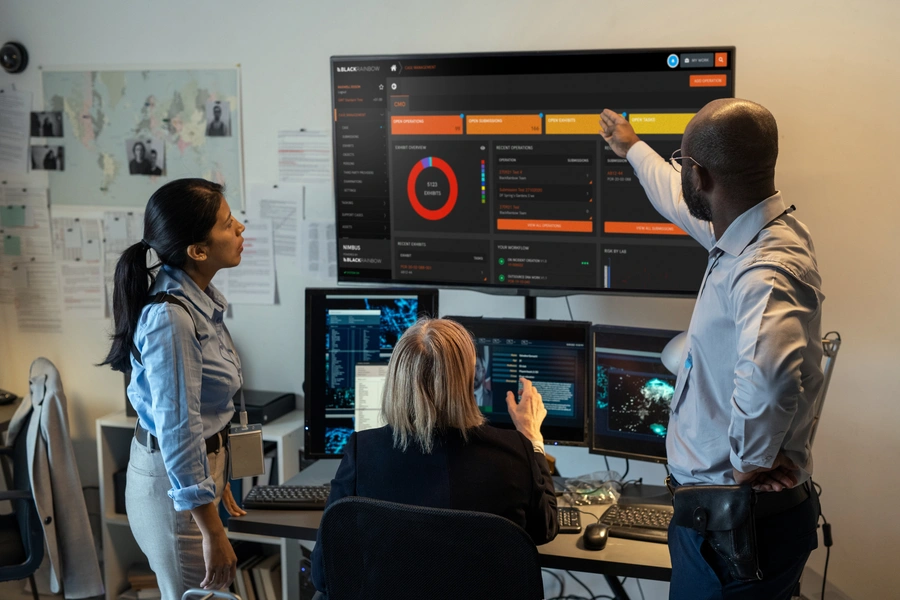
Nikki Moscrop, Head of Law Enforcement and Government Division at Black Rainbow, on how an intelligent solution assists with a collaborative approach to modern policing
There are endless challenges that policing is faced with day to day, and these are often dealing with the breadth, complexity, and volume of crimes to investigate, making it even more important to be accountable for their actions.
There is a global recognition in policing to improve the service to investigate crime of any category.
UK Policing is facing an ever-growing demand on its detective resource whilst trying to manage a national shortage of detectives.
In 2022/23, Metropolitan Police Service investigated 9,000 reported rapes – a 244% increase since 2012. Baroness Casey of Blackstock who was asked in 2021 to lead an independent review into the culture and standards of the organisation. The review was commissioned following the murder of Sarah Everard.
It is inevitable that an efficient case investigation platform is a core requirement for all teams tasked with the investigation of complex offences.
The Police Digital Service Strategy 2020 – 2030 references five key digital ambitions, of these, two specific strands address these challenges with – (Strand 2) Addressing Harm and (Strand 3) Enabling officers and staff through digital.
Driving efficiency
Black Rainbow’s NIMBUS solution fulfils this need, driving efficiency, integrity, and high standards into every case it is applied to.
Black Rainbow was formed for this sole strategic intent of providing a modern and innovative solution to market.
Our NIMBUS solution is stimulating the future for the investigation sector, and our customers would testify that NIMBUS is key technology policing needs to better manage investigations in this digital age and on the mission to protect the public.
Built with policing, NIMBUS is transforming the way investigations are being managed, solving inefficiencies, and managing risks faced.
With multiple His Majesty’s Inspectorate of Constabulary and Fire and Rescue Services (HMICFRS) inspections and outcome reports recommending that policing should and must have better case management for handling investigations.
This has also been coupled with the need to have ISO accreditation for conducting forensic work across all disciplines, with further pressure of the mandatory powers that have been granted to the UK Forensic Regulator.
NIMBUS is the first integrated investigation case and quality management system available to the market to start addressing these pressures.
The importance of Quality Management is the act of overseeing activities and tasks required to maintain a desired level of excellence, to effectively manage risk, without compromising on efficiency.
This is only achievable by integrating all quality related functions and processes throughout operational delivery and into case management.
With numerous other capabilities, every bit of information is recorded in a coordinated way enabling investigators to see the bigger picture, with an effective and defensible audit trail, making it The Investigation Platform and of critical importance to policing.
As investigations become more complex and time sensitive, physical, and digital information needs to efficiently make its way into the central source of the investigation command.
Systems and processes
This can only be done with systems and processes that allow an Investigator to sift through the vast amount of available information to identify what is relevant and what is not.
NIMBUS absorbs this information to rapidly understand and build a visual sequence of events.
Designed to streamline this process, reduce data duplication, and optimise decision making whilst maintaining investigation integrity and disclosure rules.
Whilst UK Policing are making good strides to improve technology into policing, such as tablets and smartphones, there is still a journey to go with modernisation.
Policing still faces challenges of a multitude of legacy systems that on deployed on premise, creating inefficiencies and lack of interoperability between systems, and sharing of information.
The new age of moving to cloud brings huge advantages of which UK Policing are embracing driving efficiency, interoperability, and more importantly security around data.
NIMBUS has been built with this in mind, deployable in private or public cloud (that is National Policing Information Risk Management Team (NPRIMT) complaint and Police-Assured Secure Facilities (PASF) certified), mobile device compatible and has the capability of bringing multiple stakeholders into the system with secure access permission controls all the way up to Top Secret classification.
Furthermore, focusing on modern technology, do you automate or orchestrate? The market is full of ‘Automation’ labels.
Human intervention
Automation refers to the process of using technology to automatically perform a specific task or set of tasks without human intervention. Take the Forensic market where a vendor provides automation capability to their standalone tool.
This is why the ability to orchestrate is critical, especially within a laboratory or collaborative environment.
Orchestration is the automated arrangement, coordination, and management of multiple systems and technologies providing you with an overall view across the business.
It gives you the ability to pull as many integrations as possible or automations into one manageable environment alongside digitising standard operating procedures, asset alignment and licensing management surrounded by relevant quality standards.
NIMBUS has an integral orchestration platform allowing unlimited technology integrations and automations, whilst linking in operational procedures, people, assets, and quality management to be combined in a simple visual workflow builder. NIMBUS It is technology agnostic, flexible and evolves alongside business changes.
NIMBUS has a further essential capability specifically for intelligence generation, management, analysis, and reporting.
Building on case or incident data available within operational analytics, giving real time access to potentially invaluable information, this rich source of pertinent data can enable important pattern matching across cases where no obvious links were previously known and risk profiling.
We are proud to continuing working together with policing to deliver strategic and operational improvements that enable and empower police officers and staff to tackle the challenges in front of them now and in the future.